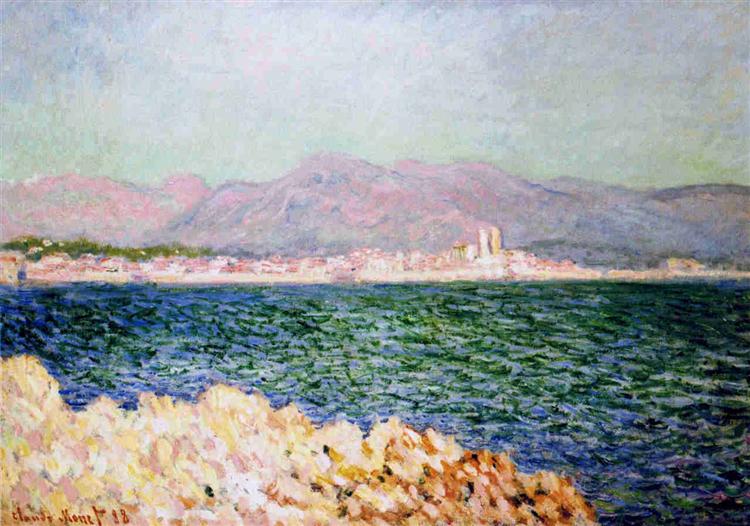Tanım
Claude Monet's The Gulf of Antibes, painted in 1888, is a magnificent representation of the French master's Impressionist style. In this painting, Monet captures the light and atmosphere of the Mediterranean, offering the viewer an almost tangible feeling of warmth and serenity. The composition focuses on the vibrant seascape, where the water's surface reflects a captivating play of light and shadow.
The focal point of the work is the wide horizon stretching out to sea, outlined by the gentle curve of the coastline. Monet employs a rich palette of blues, greens and yellows, which not only represent visual reality but also communicate a sense of calm and introspection. The variation in the hues of the water reflects the influence of the sun and the whims of the wind, elements that Monet masterfully translated into his painting.
On the left, the mountains framing the gulf are softly drawn, with a loose and dynamic brushwork that characterizes Monet's style. These mountainous details are not just a passive background, but interact with the water and the sky, creating a dialogue between the elements of nature. The clouds, which slide lazily across the sky, are depicted with light strokes that suggest constant movement, adding a sense of depth and space to the scene.
As for the absence of human figures in this work, Monet suggests an intimate connection with nature. The choice not to include characters alludes to the possibility of isolation and personal contemplation, allowing the viewer to complete the narrative with their own interpretation and emotions. This type of approach is characteristic of Impressionism, where art does not seek to narrate a concrete story, but to evoke feelings and a particular atmosphere.
Monet worked in the Gulf of Antibes during a period of his career when he was increasingly seeking the fleeting essence of the moment, an approach that was influenced by his interest in light and how it affects the perception of the environment. His loose brushstroke style, which often appears almost abstract when observed up close, becomes a powerful tool for creating the effect of movement and the impression of an instant transfigured before the viewer's eyes.
The Gulf of Antibes sits within the broader context of Monet’s repertoire, which includes other iconic seascape works such as Impression, Sunrise and The Rouen Cathedral Series. However, its exploration of the Mediterranean landscape offers a new perspective on the interplay between man, light and nature. The work is testament not only to Monet’s virtuosity as a painter, but also to his relentless desire to capture the ephemeral moment, reminding us that the visual experience of art, like nature itself, is a series of fleeting moments that weave together in a continuous flow.
In short, "The Gulf of Antibes" is a brilliant demonstration of Monet's talent as a precursor of Impressionism, where the technique of brushstrokes, the exploration of color and the connection with light combine to create a work that invites the viewer to immerse themselves in the ephemeral beauty of the seascape.
KUADROS ©, a famous painting on your wall.
Hand-made oil painting reproductions, with the quality of professional artists and the distinctive seal of KUADROS ©.
Painting reproduction service with satisfaction guarantee. If you are not completely satisfied with the replica of your painting, we will refund 100% of your money.

